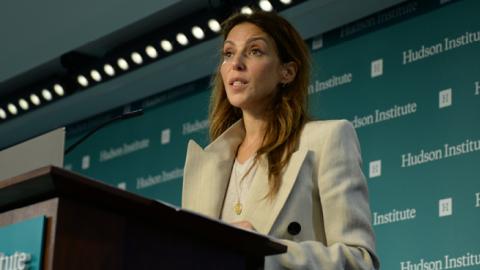Across the world’s liberal democracies, anti-Semitism has metastasized into a crisis too large to ignore.
Below, find some key resources Hudson Institute has produced to confront this problem: a national poll gauging the perspectives of likely 2020 voters on anti-Semitism; an English translation of a new report by the German government’s domestic intelligence service; and a major event on modern anti-Semitism's spread across Europe and the U.S.

Expert perspectives from the government, law enforcement and journalism discuss the poll and spread of modern anti-Semitism at Hudson's conference, Is America Experiencing Europe's Anti-Semitism?
Hon. Elan Carr, Special Envoy to Monitor and Combat Anti-Semitism, U.S. State Dept.:
Anti-Semitism is anti-Americanism, whether it comes from the ethnic supremacist right or the fringe anti-Zionist left or radical Islam... their values, what they believe, is so utterly incompatible with every value upon which this country was built, that simply coexistence - if they are in charge, that is - with the America we know today is not possible.
Simone Rodan-Benzaquen, director of AJC Europe:
In Europe, much more than in the United States, a dramatic increase of anti-Semitism comes from Islamists. All violent anti-Semitic acts in the past 13 years in Europe have been committed by jihadists. And Islamists, whether or not, have made anti-Semitism their political backbone, disseminating deadly theories about Jews in mosques, schools and social media, satellite television, through NGOs and on the streets.
[In the U.S.,] the proliferation of white nationalist supremacy theories [from] the far right is gaining traction. The fact that the last two anti-Semitic attacks in the U.S. were committed by a white supremacist should lead to a strong, clear-eyed approach. This phenomenon is only reinforced by growing populist movements on both sides of the Atlantic that, while not being anti-Semitic at a first glance, often play with a certain sense of ambiguity, never entirely pushing away those who are following them.
Mitchell Silber, former director of intelligence analysis for the New York Police Department:
Anti-Semitism in the U.K. is at its apex…It has moved to the mainstream via the Labour Party, via students groups, universities and the unions. And ironically, those people who are the purveyors of the anti-Semitism believe in their hearts that they're not anti-Semites.
Marc Weitzmann, author of "Hate: The Rising Tide of Anti-Semitism in France (And What It Means for Us)":
France is the cradle of a certain narrative of hate that traveled from France to Germany to practically everywhere.…The situation started to unravel between the end of the peace process in the Middle East in September, 2000 - and 9/11 one year later. The anti-Semite incidents started in the suburbs. [The French] were not prepared at all to deal with what was going on in the suburbs. There was a huge denial of what was going on, and the murders went on.

New Translation: Anti-Semitism Among Islamists in Germany
Hudson Institute has produced an English translation of “Antisemitismus im Islamismus,” authored by the German government’s domestic intelligence service, the Bundesamt für Verfassungsschutz, in March 2019. The report examines the major Islamist sects and the religious, territorial, and political motives that drive anti-Semitism, and its potential as a starting point for Islamist radicalization.
















